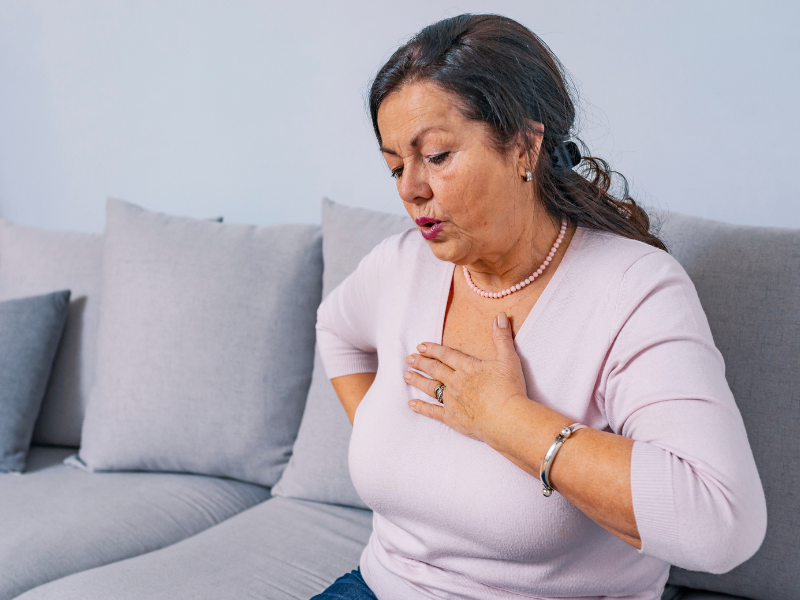AFib vs Heart Attack: Know the Difference

Author: Debbie Humphrey
While I was on an extended vacation, a dear friend and colleague was at her home when she began feeling strange. Her heart was racing, her blood pressure was elevated, and she thought she was having a heart attack. Fortunately, her adult son was visiting and called 911.
She was rushed by ambulance to Trinity Medical Center, where she underwent a series of tests and labs, and she was admitted to the hospital for further observation. Her doctor assured my friend that she had not suffered a heart attack but instead was diagnosed with atrial fibrillation (AFib) that had developed due to blood pressure medication my friend had been taking for 20 years.
Any cardiac issue is serious and can arise at any time, which is why I wanted to closely examine AFib versus a heart attack to know the difference, because many of our caregivers at Home Helpers assist seniors and veterans with heart conditions.
Dr. Andrea Todini a Cardiac Electrophysiologist in Orlando, FL, said, “Many times, patients who experience a particularly bad episode of atrial fibrillation or AFib end up in the emergency room thinking they had a heart attack. After significant testing, they may find out, to their surprise, that they have AFib instead. And while AFib and a heart attack share some symptoms, they are very different conditions with very different treatments and outcomes.”
Atrial Fibrillation (AFib)
What it is:
AFib is an irregular and often rapid heart rhythm that starts in the upper chambers of the heart (the atria). It’s a type of arrhythmia.
Cause:
- Electrical signals in the heart become chaotic.
- Often related to age, high blood pressure, heart disease, or other health conditions.
Symptoms:
- Palpitations (fluttering or racing heart)
- Fatigue or weakness
- Dizziness or lightheadedness
- Chest pain
- Shortness of breath
- Sweating
Risks:
- Increased risk of stroke
- Heart failure, if left untreated
Treatment:
- Medications to control rate/rhythm
- Blood thinners to reduce stroke risk
- Procedures like cardioversion or ablation
Heart Attack (Myocardial Infarction)
What it is:
A heart attack happens when blood flow to part of the heart muscle is blocked, usually by a clot in a coronary artery.
Cause:
- Most often due to coronary artery disease (plaque buildup in arteries)
- Can also be caused by a spasm of a coronary artery
Symptoms:
- Chest pain or pressure (often described as a squeezing or heavy feeling)
- Pain that may radiate to the arm, jaw, back, or neck
- Nausea, sweating, shortness of breath
- Fatigue or indigestion (especially among women)
Risks:
- Heart muscle damage or death
- Can be fatal without prompt treatment
Treatment:
- Emergency care with medications, stents, or surgery (like bypass)
- Long-term lifestyle changes and medications
In Summary:
- AFib = Electrical problem → Irregular heartbeat, increases stroke risk
- Heart Attack = Circulation problem → Blocked blood flow, damages heart muscle
That’s an important and often overlooked connection.
Some high blood pressure (hypertension) medications can, in certain cases, trigger or worsen atrial fibrillation (AFib), like in the case of my friend, especially if your body is sensitive to changes in blood pressure or heart rhythm.
Blood Pressure Medications That May Contribute to AFib include:
- Beta blockers and calcium channel blockers generally help prevent AFib, but in some cases, the dose or how your body responds can cause side effects.
- Diuretics (water pills) can cause electrolyte imbalances (like low potassium or magnesium), triggering irregular heart rhythms, including AFib.
- ACE inhibitors and ARBs are usually heart-friendly, but if they drastically lower your blood pressure, it can sometimes affect how the heart conducts its electrical signals.
Why This Matters:
If your blood pressure drops too low or your electrolytes get out of balance, your heart’s electrical system can become unstable, leading to episodes of AFib.
What You Can Do:
- Talk with your doctor about your medication history and AFib episodes. There might be alternative meds or dosages that work better for your body.
- Monitor blood pressure at home to watch for big fluctuations.
- Ask to have your electrolytes checked regularly, especially potassium and magnesium.
Please be advised:
If you develop a new heart rhythm issue after starting or changing blood pressure meds, don’t assume it’s unrelated. Always speak with your healthcare provider! They may need to adjust your treatment plan.
If you or a senior loved one contends with cardiac conditions and could benefit from in-home care services for a better quality of life, I gladly offer a FREE Consultation to complete an assessment so I can create a personalized care plan and match the perfect caregiver to make life easier.
Home Helpers® professional caregivers provide non-medical assistance and support with companion care, heart-healthy meal planning and preparation, recuperative care, personal care, homemaker services, respite care, specialized Alzheimer’s and dementia care, wellness calls, medication reminders, and more.
We, at Home Helpers® Clearwater, are honored to have been ranked among the Activated Insights Top 100 Leaders in Experience for home care providers in 2025 and to have received the Best of Home Care® Provider of Choice, the Best of Home Care® Employer of Choice, and the Best of Home Care® Leader in Experience Awards in 2025, along with the Caring Super Star 2025 Award.
Home Helpers Clearwater proudly serves male and female seniors, veterans, and differently abled individuals in Bayonet Point, Clearwater, Clearwater Beach, Dunedin, Gulfport, Holiday, Hudson, Largo, Madeira Beach, New Port Richey, North Redington Beach, Oldsmar, Palm Harbor, Pass A Grille, Pass A Grille Beach, Port Richey, Redington Shores, Safety Harbor, Saint Petersburg, Seminole, South Pasadena, Tarpon Springs, Tierra Verde, Treasure Island, Trinity, and surrounding areas. Home Helpers®…we are Making Life Easier® 727.942.2539
Sources:
ChatGPT, 2025
